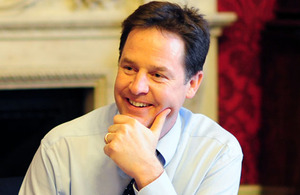Nick Clegg announces plans to cut red tape for small businesses
The Deputy Prime Minister met with small business leaders to announce a new system of regulation "designed for busy, working people".

Below are extracts from his speech:
The debate over regulation has been polarised around two extremes - on the one hand is the idea that it fixes every problem. Rules, targets, monitoring, endless government diktats to chivvy business in the right direction; mountains of form-filling so we can keep an eye on you.
Previously, the approach has been ‘when in doubt, legislate’. We saw it in public services, in the criminal justice system and, on average, British businesses were lumbered with six new regulations every working day. Thousands of different rules were left on the statute books - because new rules are free; they’re easy; they make Ministers feel in control.
On the other hand, you have the deregulation diehards who say we should scrap it all. They oppose regulation vehemently; on principle. The state has no business restricting business, and all we need to do to get the economy growing again is tear up the rule book; scrap environmental protections, workers’ rights, consumer rights and, hey presto, we’ll get business booming.
Of course deregulation plays a role, but supply side liberalisation is not the be-all-and-end-all for growth. There is simply no evidence that - on its own - it is enough.
So both extremes are ridiculous. And I’m not interested in a false debate about ‘how much’ regulation; I’m interested in what works.
When I was working in Europe as an MEP, I campaigned for less red tape, I helped craft laws cutting it. Because liberals don’t believe in rules for rules sake. We believe in intelligent, effective regulation that gets the balance right. And I’ve been working hard over the last 18 months, and will continue to do so, to restore the balance.
So the Coalition is on a mission to liberate small business. We have set ourselves the challenge of being the first British Government to leave office having reduced the overall burden rather than increased it.
First, we’re halting the tide of new regulation. To that end, Vince Cable has introduced a radical one-in-one-out policy. It is the first of its kind in the world, and the Business Secretary has made new regulation a last resort in Whitehall.
On top of limiting new rules, we’re also hacking away at the ones that already exist. Our Red Tape Challenge invites ordinary people to identify overlaps, complexity and to highlight where the benefits are out of synch with the costs. That project has already looked at 400 regulations just in retail and hospitality. Over half - 220 - will be simplified or scrapped.
Where people have expressed support for regulation, we’re keeping it. Like with the hallmarking system for gold and silver. But, if it’s tedious and pointless, its going. So no more insisting that a shop selling kitchen descaler has a poisons licence. No more having to pay for a piece of paper just to put on a little live music in a pub. Where there were twelve pieces of legislation on consumer rights, we’re collapsing them into one.
The end result will be a system designed for busy, working people rather than a job creation scheme for accountants and lawyers. And a system that saves you money. The Coalition’s attack on red tape has already saved British businesses £3 billion. A further £600 million worth of savings could come just from the decision to exempt more companies from being audited.
And there is another, specific, area of work I can unveil this morning. Changing the mindset within central government is one thing. But we make the rules - we don’t enforce them. There are a range of bodies responsible for inspection: HMRC, the Environment Agency, the Health and Safety Executive, to name a few. And they need to undergo this culture change too. They need to understand that their job is to make your life easier, not harder.
So there will be a major shake up of business inspection - going through the regulators, asking ‘are they still necessary?’; ‘Should they still exist?’; making sure that, yes, they intervene when necessary, they offer advice and support, but otherwise they let you get on with it.
They will need to respect the Regulators’ Compliance Code, which says regulators must think about and encourage economic growth. And they will have to make sure they aren’t breathing down your necks. Why, for example, should regulators be able to turn up at your door whenever they want and as often as they want? Why can’t we limit the number of inspections to, say, two a year, ensuring these bodies coordinate amongst themselves to stick within that limit?
We also know that which-body-does-what can be extremely unclear. So we’re minimising the number of authorities you will have to deal with in the future, introducing sunset clauses for new regulators, placing them under rolling review; if they become irrelevant, or their functions are replicated elsewhere, they’ll go.